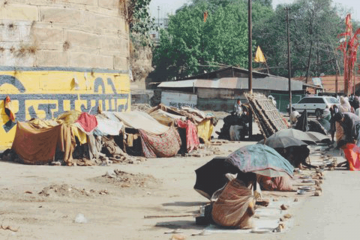As a college student, Professor Niloufer Sohrabji was drawn to economics because it taught her how to think about, and address the many challenges that ail our world. Professor Sohrabji became an educator because she wanted to share this knowledge and inspire her students to make a positive difference in the world.
Professor Sohrabji started her teaching career as a graduate student at Boston College, where she taught statistics. At Simmons, she teaches econometrics and international economics courses. Professor Sohrabji also has collaborated with colleagues to create and teach interdisciplinary courses, such as Honors Learning Community (with Professor Cathryn Mercier) and a graduate course on “Globalization and Diversity,” as well as provided faculty support for two World Challenge courses. Professor Sohrabji is a recipient of both the Dean's Award for Excellence in Teaching and the Professor of the Year Award.
Professor Sohrabji considers advising and mentoring an important aspect of teaching and is most proud of supporting her student's research interests. She has done so in courses such as econometrics, where students learn empirical tools used in economic research and apply them in their independently designed research projects as well as supervised various independent studies. In addition, Professor Sohrabji has mentored students as research assistants funded by Simmons' grants, and has co-authored articles with her former students.
Professor Sohrabji's scholarship examines the development challenges and opportunities due to globalization in emerging markets and developing countries such as India, Turkey, Ghana, and other countries in sub-Saharan Africa. Professor Sohrabji has more than 20 publications on exchange rate misalignment, trade and current account sustainability, foreign investment and foreign aid effectiveness in various peer-reviewed economics journals and books.
Professor Sohrabji has served Simmons as Chair of the Economics Department, as a member of the International Relations Steering Committee, on various faculty committees, and co-chaired (with Richard Voos) the 2020 Simmons Accreditation Self-Study. She won the Provost's University Award for Excellence in Service.
Education
- PhD, Economics, from Boston College
Courses
- Econ 101 Principles of Macroeconomics
- Econ 124/Hons 224 BRICS and the Global Economy
- Econ 218 International Trade
- Econ 220 International Monetary Systems
- Econ 222 Comparative Economies of East Asia
- Econ 393 Econometrics
Research
Professor Sohrabji continues to contribute to the trade, foreign investment, and exchange rate literature. A paper (outlined below) examines the potential benefits of an India-US free trade agreement. Maria Soraghan '21 is providing research support for this project funded by a Faculty-Student Collaborative Fellowship grant.
- The Potential Benefits of an India-US Free Trade Agreement (with Neetu Kaushik)
In our paper, we use a case study approach of as well as employ the Global Trade Analysis Project (GTAP) model to analyze the potential welfare effects of an India-US free trade agreement (FTA). GTAP is GTAP is a computable general equilibrium model that estimate the implications of FTAs on growth, employment, and trade balances.
A strand of scholarship has focused on India’s pharmaceutical sector following the shift in India’s patent law based on the WTO’s intellectual property rights agreement. One of the most exciting aspects of this line of research is that it has led to scholarly collaborations with her students, now alumnae/i. Two articles on this topic co-authored with Kaitlyn Maloney ’17 and Kristen Marquette ’19 and supported by Faculty Fund for Research grants were co-presented at the Eastern Economic Association conference in 2018 and 2020 respectively. The former was published in the Journal of Intellectual Property Rights and the latter is in preparation for submission (outlined below).
- Research and Development in India’s Pharmaceutical Sector (with Kristen Marquette ’19)
We examine the factors that affect R&D investment in India's pharmaceutical sector. We use feasible generalized least squares to estimate the impact on R&D intensity of size, age, global presence, profit rates, debt to equity rates, and patents of India’s top pharmaceutical firms between 2010 and 2020. This period also includes a Supreme Court ruling (2013) that upheld a patent denial for Novartis for a cancer treatment drug which led to a global controversy surrounding intellectual property protection in India.
Publications
Peer Reviewed Journal Articles
Sohrabji, N. and Maloney, K. (2020) “Section 3(d) and Pharmaceutical Patents in India,” Journal of Intellectual Property Rights, 25: 65-72.
Oğuş Binatlı, A. and Sohrabji, N. (2019) “Factors Influencing Foreign Direct Investment Flows into Turkey,” Entrepreneurial Business and Economics Review, 7(2): 159-174.
Oğuş Binatlı, A. and Sohrabji, N. (2019) “Monetary Policy Transmission Mechanism in the Eurozone,” Athens Journal of Business and Economics, 5(1): 79-92.
Sissoko, Y. and Sohrabji, N. (2017) “Foreign Aid Effectiveness in Ghana,” International Review of Business and Economics, 1(2): 23-54.
Dağdeviren, S., Oğuş Binatlı, A. and Sohrabji, N. (2012) “Misalignment Under Different Exchange Rate Regimes: The Case of Turkey,” International Economics, 130: 81-98.
Sissoko, Y. and Sohrabji, N. (2012) “Current Account Sustainability of ECOWAS Countries,” African Finance Journal, 14(2): 1-22.
Oğuş Binatlı, A. and Sohrabji, N. (2012) “Intertemporal Solvency of Turkey’s Current Account,” Panoeconomicus, 1: 89-104.
Sohrabji, N. (2011) “Capital Inflows and Real Exchange Rate Misalignment: The Indian Experience,” Indian Journal of Economics and Business, 10(4): 407-423.
Sohrabji, N. (2011) “Impact of Exchange Rates on Consumer Prices in India: Comparing Different Trade Liberalization and Monetary Policy Regimes,” Middle East Finance and Economics, 12:116-127.
Sissoko, Y. and Sohrabji, N. (2010) “Current Account Sustainability in African Economic Communities: Are there Regional Differences?,” China-USA Business Review, 9: 13-30.
Sohrabji, N. (2010) “Analyzing India’s Current Account Position Since the Reforms of the early 1990s,” Journal of Asia Business Studies, 4(2): 86-92.
Oğuş Binatlı A. and Sohrabji N. (2008) “Analyzing the Present Sustainability of Turkey’s Current Account Position,” Journal of International Trade and Diplomacy, 2(2):171-209.
Oğuş, A. and Sohrabji N. (2008) “On the Optimality and Sustainability of Turkey’s Current Account,” Empirical Economics, 35:543-568.
Book Chapters
Kulkarni, K., Dutta, A., and Sohrabji, N. (2020) “Is it Time to Allow Full Convertibility of the Indian Rupee?” Kulkarni, K. and Dutta, A. (Eds.) The Role of Freedom in Economic Development (pp. 91-118), Lambert Academic Publishing.
Sohrabji, N. (2017) “The Economy at Large and Why You Should Care”, Matarazzo, J. and Pearlstein, T. (Eds.) The Emerald Handbook on Modern Information Management (pp. 5-21) Emerald Publishing.
Oğuș Binatlı, A. and Sohrabji, N. (2012) “Elasticities of Turkish Trade” in Koveos, P. (Ed.) Financial Crises, Impact and Responses: The View from the Emerging World (pp. 213-228), Athens Institute for Education and Research Conference Book Publication.
Oğuș Binatlı, A. and Sohrabji, N. (2010) “How Would a Change in the Value of the Turkish Lira Affect Turkey’s Trade and Current Account?” in Subasat, T. and Yetkiner, H. (Eds.) Turkey’s Current Account Problem in the Context of the Global Crisis (pp. 164-174) (translated into Turkish), Eflatun Publishing.
Other
Sohrabji, N. (2013) “Raj Chetty: Passion and Compassion”, Indian Journal of Economics and Business, 12(2): 159-161.
Kazemi, H. and Sohrabji, N. (2012) “Contagion in Europe: Examining the PIIGS Crisis” in Research Notes, International Advances in Economic Research 18(4).
Sissoko, Y. and Sohrabji, N. (2010) “Current Account Sustainability in African Economic Communities: Are there Regional Differences?” in Pennsylvania Economic Association Proceedings.
Oğuș Binatlı, A. and Sohrabji, N. (2010) “Elasticities of Turkish Trade” in Annual International Symposium on Economic Theory, Policy and Applications Conference Proceedings.
Kazemi, H. and Sohrabji, N. (2006) “The Role of the IMF on Global Financial Institutions and Markets” in Research Notes, International Advances in Economic Research, 12(3).










